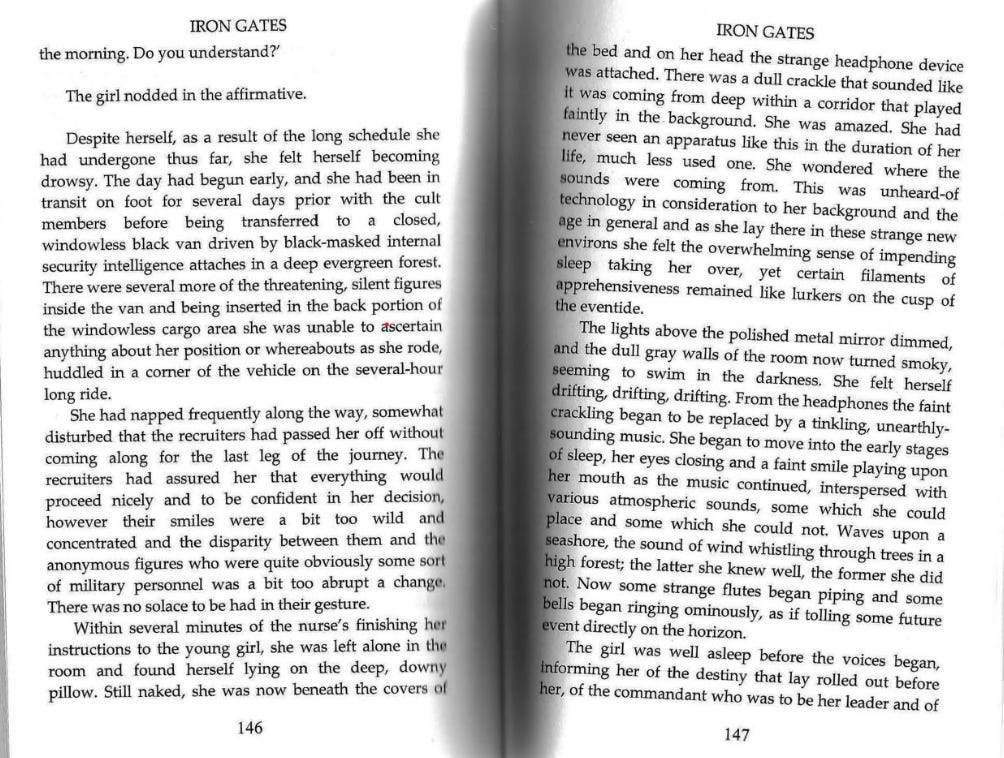A change starts to take place in this chapter. When attentively reading this piece, one starts to have the suspicion that more than one person writes this book. Perhaps it is a group of people cycling through the chapters. Although it may also be a matter of a single author tapping into his or her talents with the onset of consistent practice.
The degree of sensitivity to detail, to movement, and a kind of sweetness amid cruel darkness, comes in calm waves, achieving a placid sense of repose that is completely new in the book. There is, to a certain extent, the impression of a great maturity having been achieved. The prose is beautiful, to put it shortly, the experience of the character fleshed out with delicate fingers.
The next thing that crosses one’s mind as we see more and more of these chapters pass us by is that these are the most sensitive and advanced chapters, both from the literary and the psychological perspectives. While Chapter Nine contained insights into manipulation of the masses by Intelligence Agencies using engineered cults and manipulative multi-media, Chapter Ten is an experiential recount, full of human life.
It is, moreover, consistently the chapters in which the main female characters come to light that this superior sensitivity, this exquisite attention to the detail and softness of personal experience, comes to the forefront. If it is indeed the work of one author, we can justly say these are his favorite characters, beloved, and their development is the central axis of the story.
Against accusations of pedophilia by exterior agents, which came as a result of actual pedophiles who are interested in any literary representation of child sexual abuse, such as that depicted by the famous Marquis de Sade, upheld in today’s universities as great exponent of philosophy and sociology in literature, Iron Gates does not relish the abuse of these characters. If one looks closely, the main characters are watched going through these experiences and there is a sharp focus on their internal processes, on their emotions, on the human spirit twisting and turning.
That, against the stark perverted enjoyment of De Sade, or the more pathetic and cowardly writing of Peter Sotos, which relishes like a voyeur from behind a corner, on the cruel sadism inflicted on each and every kind of creature. There is no such relishing to be found in Iron Gates. The grown men that suffer great abuse, in any case, get the brunt of the burden. Agent Bonn and the trooper from Chapter Eight, both of whom are less than exemplary personalities, are rather set as brutal examples of psychological repression for the perceptive reader to straighten themselves up.
The girl in this chapter, the main character finally introduced, does not suffer any such cruelty, yet, and when she does, it will be reminiscent of the Australian Family Cult led by Raynor Carey Johnson and Anne Hamilton-Byrne, with suspected backing of the CIA MK-ULTRA project. This is her introduction as a superior being by virtue of her independent survival among the dregs of society in a post-apocalyptic world. A very mysterious and expertly presented sequence of scenes in non-chronological order gives us a dynamic, action-first, almost cinematic storytelling. Chapter Ten is, in fact, a masterclass in holding the reader’s attention while submerging them in pure experience without falling into the limiting and self-encased trap of stream of consciousness.
We are reminded of C.S. Lewis, perhaps even of Jeanette Winterson.





